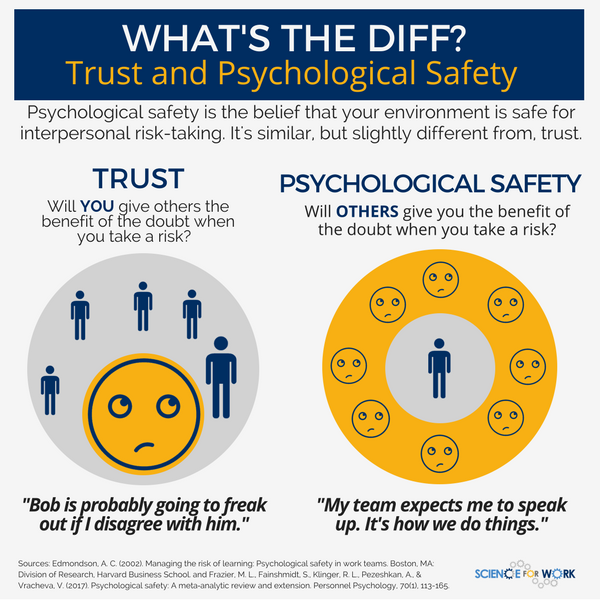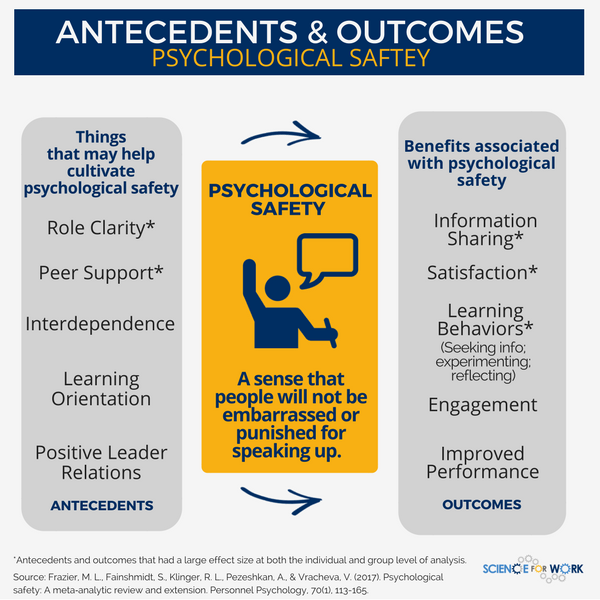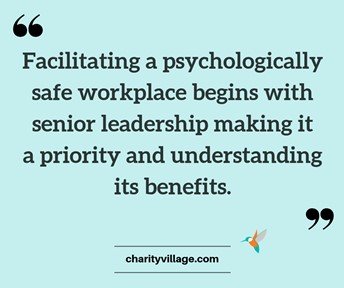Why you should pay attention to Psychological Safety in Your Organization
Wikipedia says that psychological safety is a shared belief that the team is safe for interpersonal risk taking. It can be defined as "being able to show and employ one's self without fear of negative consequences of self-image, status or career" (Kahn 1990, p. 708). In psychologically safe teams, team members feel accepted and respected.
The best way to understand the stresses, pressures and decisions that exist in a system is to hear the voice of the people that use the system directly. Their perspectives are priceless when it comes to performance improvement. If everyone can hear each other and nobody disappears into the group, psychological safety emerges. (paraphrased from Charles Duhigg's "Smarter Faster Better.")
Trust?
We can immediately confuse Trust with Psychological Safety - this graphic does a great job explaining it:


What Teams Need:
More from sourcing Charles Duhigg's notes:
- Teams need to believe that their work is important.
- Teams need to believe that their work is personally meaningful.
- Teams need clear goals and defined roles.
- Team members need to know they can depend on each other.
- Most importantly Teams need Psychological Safety.
Everyone needs to feel that they can speak up.
Members need to show that they are sensitive about how each other feels.

Are you wondering if your organization is doing well with Psychological Safety? Use this audit questionnaire to start your journey:

From an Interview at Harvard Business Review
CURT NICKISCH: Why is it that probably more people would say that they don’t feel psychologically safe at work than others? I mean, it still seems like it’s not the norm.
AMY EDMONDSON: It is not the norm at all. In fact, I think it’s unusual, which is what makes it potentially a competitive advantage. The reason why psychological safety is rare has to do with aspects of human nature, human instinct. You know, for example, it is an instinct to want to look good in front of others. It’s an instinct to divert blame, you know, it’s an instinct to agree with the boss. And hierarchies are places where these instincts are even more exaggerated.
Fighting Against Instinct
My good friends at BeHighlyReliable.com are working on the notion of speaking up or actually speaking IN, and how it directly relates to this message. Everyone needs to feel open to say something in a complex and unpredictable environment. Tell Laurin that James says "Hi."
How do we create Psychological Safety?
The leadership in your company has the major impact, because what they reinforce is what gets done, even how it gets done. What gets tolerated in an organization creates or conflicts with current culture climate. Once everyone understands how important this is, the changes can start to occur.

We really want to look good and we especially want to look good in a hierarchy. And the spontaneous way to try to achieve that goal is to kind of be quiet unless I’m sure that what I have to say will be very well received, especially by the higher-ups.
